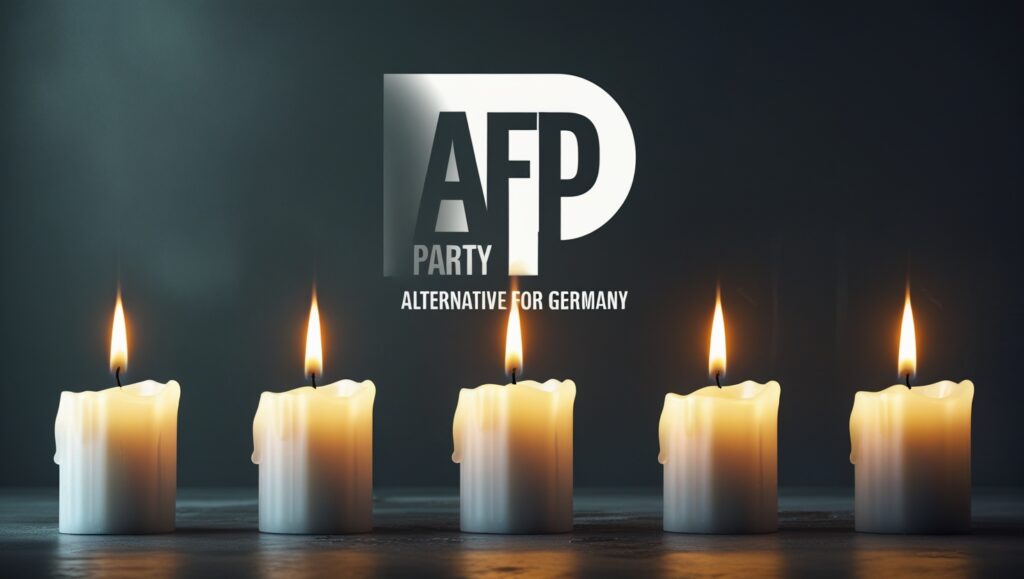Physical Address
304 North Cardinal St.
Dorchester Center, MA 02124
Physical Address
304 North Cardinal St.
Dorchester Center, MA 02124

The unexpected and terrible deaths of six candidates from Germany’s far-right Alternative for Germany (AfD) party have rocked the country in an already tense political environment. Ahead of crucial municipal elections in North Rhine-Westphalia, the title “Six AfD Candidates Die in Quick Succession” has dominated news reports, sparked conjecture, and generated debate. The timing and grouping of these fatalities have drawn criticism from people of all political persuasions, even if officials have ruled out criminal play.
The incident’s facts, wider political ramifications for Germany, and the impact on public opinion are all examined in this blog article. Our goal as we examine this strange and unnerving trend is to offer context, clarity, and insight into a story that is both intricate and captivating.

The expression alludes to the six AfD party members who perished in the weeks preceding municipal elections in North Rhine-Westphalia, the most populous state in Germany. Two of the dead were reserve candidates, and the other four were official candidates for local office. All six died in thirteen days, creating a flurry of online speculation and practical difficulties for election officials.
Police and state officials have stressed that the deaths were caused by natural causes or pre-existing medical issues, despite the dramatic title. According to reports, one candidate passed away by suicide, another from kidney failure associated with liver disease, and a third from a heart attack. Officials claim that there is no proof of foul play or coordinated activity in the remaining cases, which have not been made public.
The role of the AfD in German politics must be taken into account in order to fully comprehend the significance of this occurrence. Since its founding in 2013 as a Euroskeptic party, the AfD has developed into a far-right populist movement that is well-known for its opposition to immigration and disapproval of established political organizations. The party has gained popularity over the last ten years, particularly in eastern Germany, and it recently became the second-largest party in the federal elections earlier this year.
But there has been some dispute around the AfD’s emergence. In May, Germany’s domestic intelligence service labeled the party as “extremist,” citing its affiliations with radical organizations and xenophobic language. This designation enables the agency to use secret techniques, such as informants and surveillance, to keep an eye on the party.
The story of the AfD has become even more complicated as a result of the swift deaths of six of its candidates. Party leaders have called for care and respect for the families involved, despite some followers conjecturing about conspiracies or deliberate attacks. The AfD will look into the situation “without immediately getting into conspiracy-theory territory,” according to co-leader Kay Gottschalk.

The fatalities’ immediate effect was a disturbance in logistics. In impacted districts, election authorities were compelled to reprint ballots and advise postal voters to recast their ballots. The unexpected deaths of six candidates caused administrative problems and sparked concerns about candidate screening and health procedures, as there were more than 20,000 candidates running throughout the state.
The incident has placed the AfD in a precarious political position. The party must, on the one hand, deal with the tragedy in a sensitive and open manner. However, it is under pressure from its base to question the official story and call for more research. This delicate balancing act is representative of the AfD’s larger battle to appeal to its populist base while retaining legitimacy.
Even if talking about “pros and cons” in the context of human tragedy might seem inappropriate, it is necessary to examine the incident’s political repercussions. Increased awareness and sympathy from those who see the deaths as evidence of systematic bias or negligence could be advantageous for the AfD. Some followers have responded favorably to the party’s portrayal of the occurrence as “statistically almost impossible,” particularly on social media sites where conspiracy theories are common.
On the other hand, if the party is seen as taking advantage of tragedy for political ends, the concentration of deaths may damage its reputation. The AfD’s response has been criticized for being erratic, with some leaders encouraging speculation and others urging moderation. The party’s unity may be weakened by this internal strife and its campaign messaging may be diverted.
The fact that well-known people helped spread the word is an intriguing element. AfD leaders and even Elon Musk retweeted the economist Stefan Homburg’s description of the fatalities as “statistically striking.” These endorsements have stimulated internet discussion and brought attention to a local issue that could have otherwise gone unnoticed on a global scale.

Unexpected deaths of political candidates during election season have occurred in other countries besides Germany. Similar administrative issues have arisen in the US as a result of the deaths of multiple municipal candidates just before elections. Six deaths in two weeks, however, is a very exceptional occurrence with few historical parallels in contemporary democracy.
The event also raises comparisons to other European far-right movements, many of whom have been criticized for their internal discipline, safety, and health. Parties negotiating the nexus of populism and institutional responsibility may find the AfD’s experience to be instructive.
What led to the six AFD candidates’ deaths?
According to authorities, the fatalities were caused by pre-existing medical illnesses, natural causes, and in one instance, suicide. No evidence of foul play has been found.
What makes this occurrence important?
It is statistically uncommon for deaths to occur in close proximity to a significant election, and this has caused administrative disruptions, speculation, and public commentary.
Has the AFD made a formal response?
Indeed. Party leaders have called for a respectful probe and acknowledged the killings. While some have urged caution, others have voiced skepticism over the official answers.
Do other people get impacted?
Indeed. Although not in such a concentrated period of time, the Interior Ministry pointed out that other party candidates had also passed away in recent weeks.
Could this impact the election results?
Potentially. The incident may influence voter sentiment, especially among AfD supporters who view the deaths as symbolic or suspicious.
“Six AfD Candidates Die in Quick Succession” captures a time of significant political upheaval in Germany. The public’s response indicates deeper concerns about openness, trust, and the function of democratic institutions, notwithstanding the official narrative’s emphasis on natural causes and unfavorable timing. This episode presents the AfD with a dilemma as well as an opportunity: either show maturity or risk greater polarization.
The memory of these six people will live on in the minds of party members, officials, and voters alike as Germany gets ready for its municipal elections. Depending on how the story develops, this moment may end up being a footnote or a turning point. It continues to serve as a sobering reminder of the human cost behind the headlines and the unpredictable nature of political life.
Please leave your ideas in the comments if this analysis has caused you to think. Let’s continue the discussion.